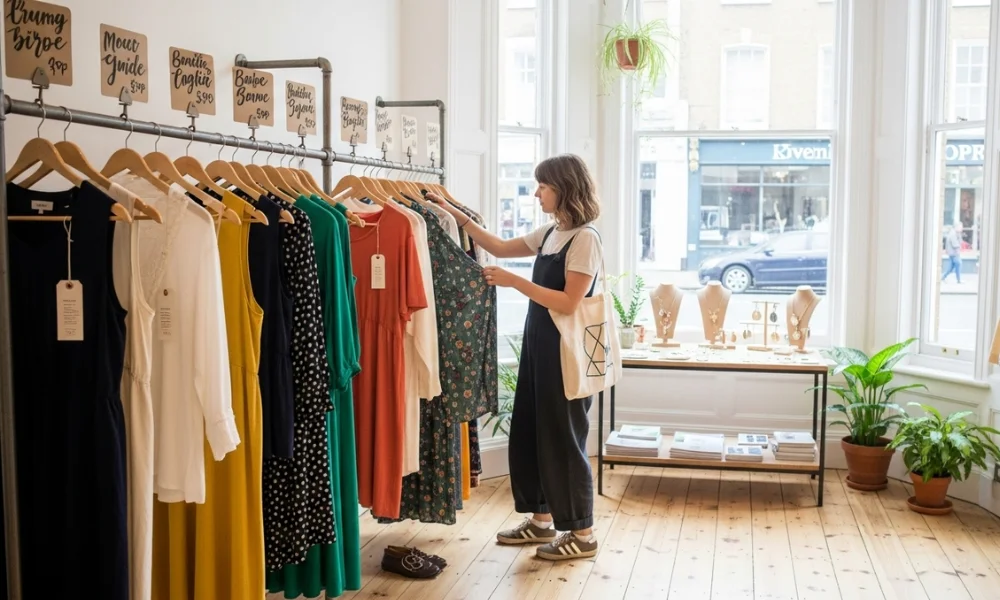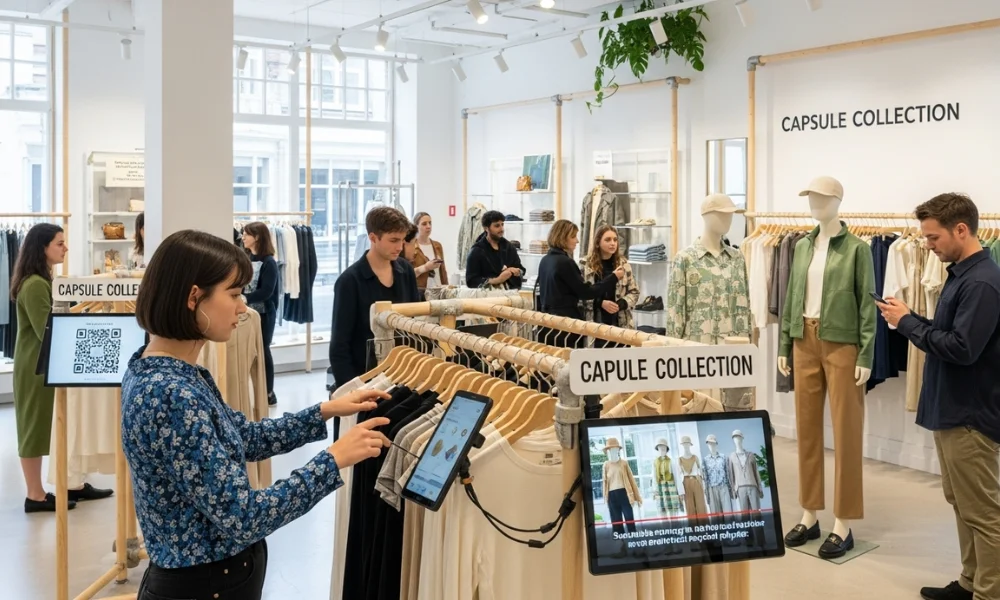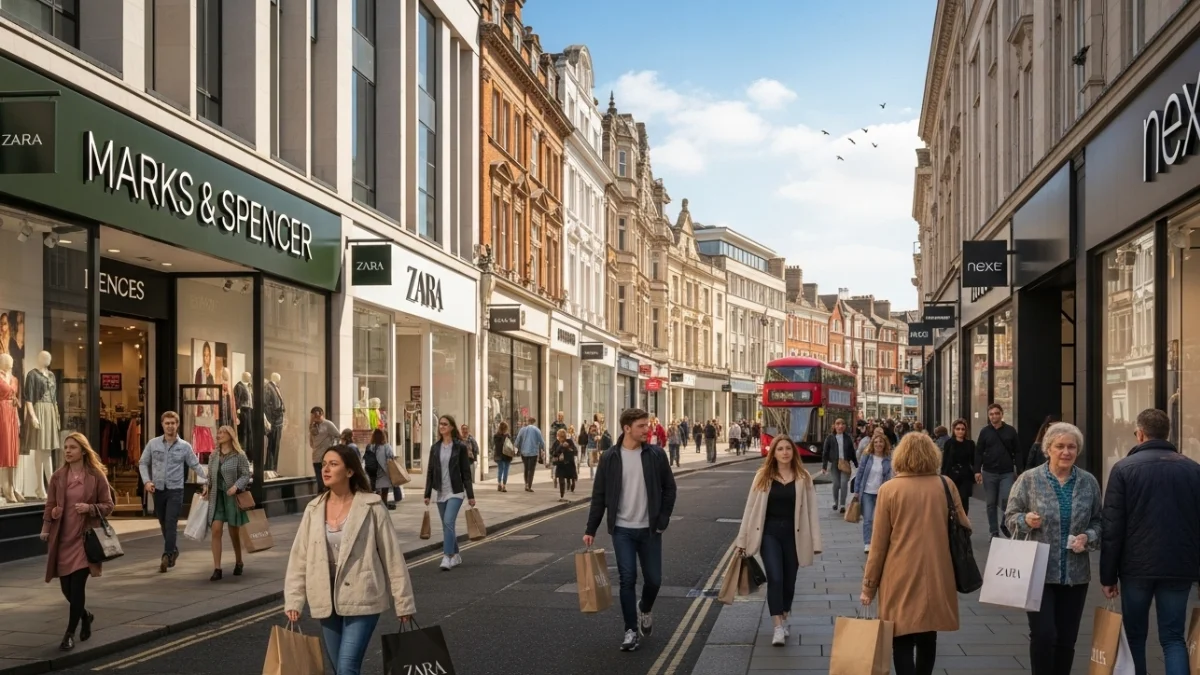Fashion in the UK changes quickly but trusted brands stay strong. “Popular clothing brands UK” means labels people know, trust and buy regularly. This guide explains high street, luxury, sustainable, and emerging British names. You will see which brands suit your budget, style and values. It also gives new 2025 data for better decisions.
How We Define “Popular” in UK Fashion
Popularity of a clothing brand depends on visibility, trust and customer engagement. In 2025, brands need strong online presence and transparent supply chains. They also require consistent quality and competitive pricing to maintain loyalty. Our focus keyword “popular clothing brands UK” covers those meeting all these tests. These signals ensure the brands mentioned here truly matter now.
Metrics and Sources
We measure popularity using clear metrics and reliable sources. Data comes from YouGov, RetailX, Salience and UK fashion sector studies. We check brand awareness, favourability, online presence and consumer sentiment. We study ecommerce vs physical store performance. Sustainability and ethical practices count heavily now.
Quick Glance: Most Popular Clothing Brands UK
This section shows the UK brands people shop and talk about most. The list combines digital visibility, customer ratings and store footprint. These names appear in the top rankings of current UK reports. They cover high street, luxury and sportswear labels together. It gives a fast overview of the landscape in 2025.
Updated Table for 2025
| Brand | Segment | Key Strength | Price Tier | Where Sold |
|---|---|---|---|---|
| Marks & Spencer | High Street | Quality basics, wide sizing range | Mid-range | Stores & online |
| Boohoo | Fast-Fashion Youth | Trend speed, strong social media presence | Budget | Online mainly |
| Next | Mid-Market | Good value, online strength, many styles | Mid | Stores + website |
| Zara | Trend-Led High Street | Frequent collections, stylish pieces | Mid-High | Malls and online |
| Burberry | Luxury Heritage | Iconic trench coats and British identity | Premium | Flagship + luxury retailers |
UK Luxury & Heritage Brands Leading in 2025

Luxury labels remain popular for tradition and prestige. Heritage names like Burberry, Barbour and Paul Smith still dominate premium segments. They offer timeless products and invest in sustainability and digital experiences. Many British shoppers choose them for quality and prestige rather than price. They remain key players in “popular clothing brands UK” for 2025.
Leading Names
Burberry leads with trench coats and timeless designs. Barbour still wins for rugged outerwear and countryside style. Gucci and Stella McCartney expand sustainability efforts further. Shoppers expect ethical sourcing and high-quality materials. These brands blend heritage and modern practices well.
High Street & Mid-Market Favourites
High street brands form the core of UK daily wardrobes. Marks & Spencer, Next, Zara, and Boohoo adapt fast to style changes. They maintain affordability while improving quality and customer service. Their wide reach keeps them top of mind for most shoppers. They also test new sustainability schemes to stay relevant.
Main Players
Marks & Spencer improves style quality and product range. Boohoo captures youthful energy and fast trend turnover. Next continues strong performance online and in stores. Zara adapts quickly to fashion demand and collaborations. These brands offer wide availability and constant newness.
Streetwear, Sports & Casual Styles
Streetwear and sportswear have become part of everyday British clothing. Trainers, hoodies, puffers, and outdoor jackets dominate 2025 sales. Brands like Nike, Adidas, and Dr. Martens mix comfort with recognisable style. Technical fabrics and hybrid items support both work and leisure. This segment continues to grow among all age groups.
Growing Demand
Sportswear and streetwear thrive on influencer culture and social media. Collaborations and limited drops build hype. Consumers love exclusivity and uniqueness. Sports brands join forces with fashion designers for crossover appeal. Hybrid clothing items become commonplace.
Sustainable & Ethical UK Brands on the Rise
Sustainability shapes the next stage of UK fashion. Many brands now show supply chain transparency and eco-friendly materials. Second-hand and repair programmes grow steadily, reducing waste and increasing trust. Ethical brands move from niche to mainstream. This trend defines which “popular clothing brands UK” will grow in 2025.
Current Landscape
Consumers demand sustainability from brands now. Many labels use eco-friendly materials and transparent supply chains. Second-hand markets and repair services gain popularity. Certifications and ethical standards help brands stand out. Repair and resale programmes increase loyalty.
Emerging & Indie British Labels to Watch

Indie brands offer fresh designs and ethical innovation. They often produce locally or in small runs to reduce impact. Many sell directly online, using social platforms for marketing. These labels fill style gaps left by bigger brands. They are the future “popular clothing brands UK” for younger shoppers.
Fresh Ideas
They innovate in sustainability and local production. Online boutiques support these smaller labels strongly. Social media gives visibility for unique UK names. Limited runs and direct sales create excitement. These names can quickly become mainstream.
Popularity by Price Tier
Price tier helps shoppers match brand to budget. Budget brands like Primark and Boohoo offer trend items fast. Mid-range brands like Next, M&S and Zara balance quality and style. Luxury names provide premium craft and heritage but cost more. Cost per wear can show real value better than ticket price.
Understanding Tiers
Budget brands cost less but need to maintain quality. Mid-range options like Next, Zara, M&S offer that mix. Luxury brands cost much more but provide prestige and superior quality. Buyers at that level expect craftsmanship, brand heritage and ethical credentials.
Popularity by Consumer Type
Different consumers prefer different brands based on lifestyle and values. Women often buy high street and fast fashion items. Men lean toward heritage and sportswear brands. Young shoppers follow streetwear and resale options. Families want inclusive sizing and value across budgets.
Size, Lifestyle, and Values
Inclusive sizing becomes more important. Brands offering extended sizes see better loyalty. Lifestyle factors like work, outdoors, comfort affect choices. Those who care about ethics and sustainability align with emerging ethical brands. Value for money remains a priority for many households.
Where to Buy UK Popular Clothing Brands
Buying from official channels protects your rights and ensures authenticity. High street stores remain essential for mid-market shopping. Flagship shops and boutiques serve luxury names. Online marketplaces and social platforms provide convenience and a wide choice. Omnichannel strategies help brands meet shoppers anywhere.
Safety Tips
Always check return policies and authentic tags before purchasing. Look for clear delivery and sustainability details. Verified retailers reduce the risk of counterfeits. Reading customer reviews also helps confirm product quality and sizing.
Trends Shaping Brand Popularity in 2025

Sustainability and social commerce reshape UK fashion fast. Quiet luxury replaces loud logos. Collaborations and capsule collections attract buzz. Online search interest shows rising demand for ethical and durable fashion. Brands that adapt to these shifts grow fastest.
Fashion’s Ethical Evolution
Legislation forces transparency and traceability. Brands address the environmental impact of returns. Consumers expect durable clothes rather than rapidly replaced ones. Ethical labels can seize a competitive advantage. Heritage and the high street both feel these changes.
How to Choose the Right UK Brand for You
Picking the right brand needs a clear plan. First, decide on the budget and style needs. Seek durability and ethics behind the brand’s story. Fit matters: check size charts and reviews. After-sales services like repair and returns increase value.
Smart Shopping
Prioritize comfort along with aesthetic and values. Pick brands that match your daily life. Look at certifications for sustainability claims. Choose pieces you will wear often. That way, you spend less and waste less.
Final Thoughts
Popular clothing brands in the UK succeed by balancing value, style, ethics, and reputation. The best brand depends on you: consider your budget, lifestyle, and values. High street gives fast style, luxury gives prestige, sustainable gives ethics. Emerging brands fill gaps and offer fresh alternatives. Use this guide to make informed choices that feel right.

